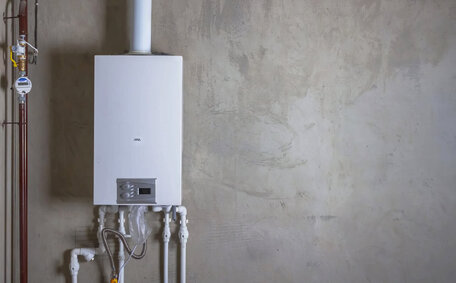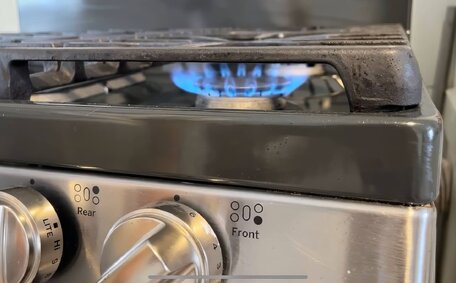Understanding Your Gas Appliance Energy Usage
Upgrading to newer models of natural gas appliances can reduce energy consumption and lead to savings.
Switching to efficient electric alternatives could reduce a household’s energy bills by about $790 annually. However, routine maintenance and changing usage habits can also lead to energy and cost savings without replacing appliances.
Maintaining your gas appliances, by checking seals and clearing ports, ensures peak efficiency and dust-free operation. Lower your gas hot water system temperature by 10-15 degrees to maintain comfort and save energy.
Tips for Improving Efficiency of Existing Gas Appliances
There are straightforward measures you can take to enhance the energy efficiency of your current gas appliances without the need for replacements:
Perform Regular Maintenance
- Replace worn oven door seals to prevent heat loss.
- Regularly clean burner ports and filters for optimal gas appliance performance.
- Ensure flued gas heaters have clear flues for obstructions to enable proper ventilation
Modify Usage Habits
- Run your dishwasher only when full to maximise energy efficiency.
- Use pots that match the burner size to reduce cooking time and avoid energy waste.
- Lower the heater’s thermostat by 1°C to possibly reduce heating costs by ten per cent.
Upgrade Components
- Switch to a 5-star energy efficient shower head to save on hot water usage.
- Replace halogen downlights with LEDs to reduce lighting energy use by 90%.
- Insulate hot water pipes to minimise standby heat loss.
Implementing these tips can help curtail your appliances home energy expenses, shrink your carbon footprint over time, and let you enjoy the conveniences of gas appliances. For more tailored advice, get your queries addressed by the team at Glenhaven Plumbing.
When Professional Maintenance is Needed
Although DIY maintenance can enhance efficiency, gas appliances need professional servicing to ensure safe and optimal operation.
It’s crucial to engage qualified plumbers and gas fitters annually to conduct thorough safety checks and tune-ups. They will:
- Test for gas leaks
- Assess burner flames and ventilation
- Ensure safety devices are functioning properly
- Detect small problems before they become big (and expensive!) issues
Glenhaven Plumbing experts use sophisticated equipment to thoroughly inspect appliances, like washing machines, identifying even the smallest gas leaks. Advanced diagnostic equipment also helps pinpoint problems not visible to the naked eye.
Beyond safety, grasping what you need know about professional maintenance ensures maximisation of energy efficiency, reducing your energy bills. Fine-tuning appliance operations yearly can lower consumption by up to 10%, adding up to major savings over time.
Comparing Efficiency Across Models
When it comes to gas appliances, significant advancements in technology over the years have led to more energy efficient models. The key difference across various brands and types of gas appliances is their energy rating and efficiency level.
When considering new appliances, review their star rating to understand their energy efficiency. Gas models with higher star ratings are significantly more efficient than 1-3 star models, typically saving more energy. The most efficient models may cost more initially but can result in significant energy savings and lower running costs in the long term.
A 6 star gas hot water system uses about 30% less energy than a 3.5 star system, illustrating how much energy can be conserved. With meticulous planning, your washing machine expenses can see a reduction of hundreds of dollars per annum. While it costs more initially, the energy savings usually offset the price difference in under 5 years.
Some gas appliances are evolving to rival modern electric systems in efficiency. Models like 5 star instantaneous gas hot water heaters now match the efficiency of heat pump systems. Integrating solar power further boosts savings by utilising renewable energy to run appliances.
Choosing higher star rated, technologically advanced gas appliance models - and knowing about using them judiciously - provides environmental benefits through lower emissions. It also delivers household budget savings that multiply over time.
Considering a Transition to Efficient Electric Alternatives
Technological advancements are making electric appliances increasingly efficient alternatives to gas. Switching from gas heaters to reverse-cycle air conditioning offers environmental and potential cost savings.
Electric heat pumps for hot water and heating/cooling now match or even exceed the efficiency of gas systems, classifying them as highly efficient appliances. Induction cooktops can also cook more speedily and use more efficiently the power they consume. Plus, powering appliances with solar drastically cuts grid energy consumption.
There are financial incentives available to help households transition from gas. For instance, initiatives such as the Sustainable Household Scheme in NSW provide discounts on energy-efficient technology tailored to your home’s needs, including gas water heaters and heat pump hot water systems.
Glenhaven Plumbing specialists keep your home energy-efficient with current rebates and advanced electric solutions. We can provide tailored advice and assistance for taking your home off gas to more sustainable electric alternatives over time.
Heat Pumps for Heating and Cooling
Heat pumps are a more energy efficient electric alternative than traditional gas heaters. Heat pumps work by moving heat rather than generating hot water heat through combustion like traditional gas heaters. This makes them cheaper to run.
There are two main types of heat pumps:
Air Source Heat Pumps
Air source heat pumps draw outdoor warmth to efficiently heat your home. Even at low outdoor temperatures they operate efficiently. Ducted and wall-mounted heat pumps distribute warm or cool air seasonally throughout your home.
Ground Source Heat Pumps
Ground source or geothermal heat pumps exploit cold water stored beneath your garden to provide warmth. While installation costs are higher, buried pipes enable heat transfer to indoor air conduits with minimal energy use.
Alongside heating, many heat pumps provide cooling capabilities too. As reversible systems, their internal flow direction switches between winter and summer modes automatically, similar to the function of evaporative coolers. This dual-purpose functionality replaces the need for separate heating units and air conditioners.
With up to 400% operational efficiency, heat pumps use far less electricity than gas heaters or electric resistive heating. This equals lower energy bills - by as much as $500 annually when substituting ducted gas heating. Heat pumps also emit around half the greenhouse gases of gas systems.
Consult Glenhaven Plumbing today for advice on finding the best gas heating alternatives.
Induction Cooktops
Induction cooktops are surfacing as more energy-efficient alternatives to traditional gas cooking stoves. Operating through magnetic induction, these electric cooker tops heat pots and pans directly while wasting minimal heat. This precise, targeted power delivery makes them 90% efficient - almost double the efficiency of gas cooktops.
Beyond remarkable efficiency, induction cooktops have other benefits:
- Faster cooking times due to instant and consistent heating
- Cooler kitchens thanks to reduced ambient heat dissipation
- Safer surfaces that dont remain hot after pans are removed
- Sleek, modern aesthetic appeal
The dsTtechnology does require compatible cookware with ferromagnetic bases. But many retailers now stock induction-ready stainless steel and enamelled cast iron pans perfect for switching from gas.
For sustainable cooking, households find that appliances such as induction stoves meet the criteria for efficiency, convenience, and safety. Consult Glenhaven Plumbing to explore how induction technology could enhance your kitchen.
Financial Incentives for Switching Appliances
There are financial incentives offered by federal and state governments designed to assist households in switching from gas to more efficient electric cooking appliances.
These programs offer homeowners financial assistance, including rebates, discounts, and grants, to make energy-efficient technology more affordable. This makes the switch more affordable while delivering ongoing savings on your energy home bills thanks to lower running expenses.
The NSW government’s Sustainable Household Scheme provides significant rebates on installing all-electric reverse cycle air conditioning and heat pump hot water systems as replacements for gas appliances.
These initiatives support households in moving away from the gas grid, fostering a more sustainable home environment. They also lessen demands on ageing gas infrastructure. The programmes aim to ease the transition towards more climate-friendly, cost-effective electric alternatives over time.
Consult the experts at Glenhaven Plumbing to discover which rebates you are eligible for. We stay up to date on all grants and government incentives available to reduce the cost of upgrading your appliances. This allows us to provide tailored advice on the most suitable energy-efficient technologies for your home and budget.
Health and Environmental Benefits
Selecting energy-efficient kitchen appliances, such as a modern gas stove, brings vital health and environmental benefits. Energy-efficient appliances are cost-effective and reduce emissions that can worsen respiratory health issues.
Gas stoves and ovens generate air pollutants like nitrogen dioxide inside homes. Reducing reliance on gas appliances improves indoor air quality and decreases risks of conditions like asthma.
On a global scale, energy-efficient appliances cut greenhouse gas emissions associated with electricity generation and gas distribution. Widespread adoption of technologies like induction cooktops and heat pumps prevents millions of tonnes of planet-warming emissions each year.
By transitioning to efficient electric alternatives, households take control of your energy use, thus contributing to environmental sustainability and personal wellbeing. Government rebates also make these appliances more accessible.
Consult the team at Glenhaven Plumbing to learn about suitable energy-efficient appliances for your home. We stay informed on the latest government incentives to help you affordably enhance efficiency while benefiting your health.
Complementing Electric with Solar
Solar power integration with energy-efficient appliances cuts your grid dependency and boosts cost savings due to lower operational expenses.
Installing rooftop solar panels allows you to use renewable energy for your appliances. Excess solar electricity can be returned to the grid for a feed-in tariff.
High-quality solar systems can potentially power appliances on sunny days. Solar power use during the day can lower electricity bills.
A solar battery storage system allows for storing excess energy for night use. This allows you to run more electric appliances, including reversecycle air conditioners, using your own renewable power round-the-clock.
Consult the team at Glenhaven Plumbing to assess solar system options tailored for your home. We recommend the ideal panel and battery capacity to match your electric appliance usage needs for maximum sustainability and cost savings.





